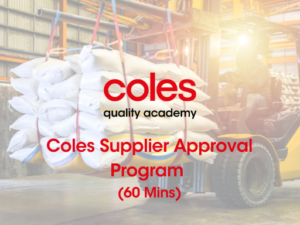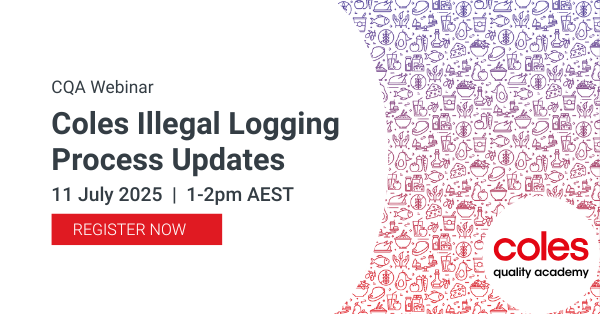CQA Membership’s Online Training Courses
The CQA Membership program is ideal for the HACCP team, technical staff, QA staff and anyone who needs to understand the key requirements when working with Coles. It would be an ideal induction program for new staff. This membership gives you 12 months access to the CQA Portal, the ability to use the entire portal features, including webinars, news, technical experts and access to 14 online courses.
These 14 courses have been selected and customised specifically to support suppliers of Coles Own Brands products and can be completed at your own pace.
Coles Supplier Approval Program (60 Mins)
This course provides an introduction to the Coles’ Supplier Program Requirements, guidance on the importance of customer trust; Third Party Certification and Codes. Participants will be able to understand Coles Supplier Program requirements; understand why a Quality Management System is required; understand the Review process for the Coles Supplier Approval Program and understand relevant Standards and Certification processes.
Developing and Implementing an Approved Supplier Program (75 Mins)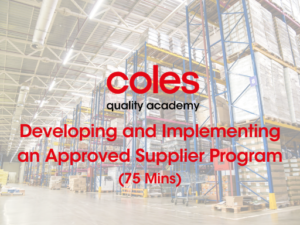
This course provides an introduction to the Coles requirements for an Approved Supplier Program and will explain how to develop an Approved Supplier program. This course covers the considerations for different suppliers; the considerations and process for design of the program. Participants will be able to understand Coles’ requirements for an Approved Supplier Program; understand the food safety and quality risks presented by existing and potential suppliers; and explain how to develop an Approved Supplier program.

Business Continuity and Incident Management (90 Mins)
Coles expect their suppliers to have a documented crisis management and business continuity plan to ensure ongoing supply of safe and suitable products. The course will look at Incident Management/Crisis Management, Risk Assessment and Business Continuity Planning. Participants will be able to understand the relationship between Incident Management and Risk Management; understand assessment methodology used at Coles ; understand what Business Continuity Planning entails as followed at Coles; and explain how to incorporate the key components of incident/crisis management as part of a wider risk assessment and business continuity strategy.
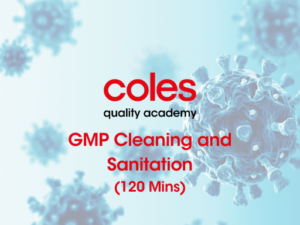
GMP Cleaning and Sanitation (120 Mins)
Poor cleaning and sanitising practices or poor personal hygiene practices have been the cause of numerous foodborne outbreaks across the world. All Food Safety Quality Assurance. Standards require rigorous cleaning and GMP procedures. This course will cover how to develop an effective cleaning program and the verification processes to ensure effectiveness and improvement of a program. Participants will be able to understand the requirements to develop and effective cleaning and sanitation program; describe food safety hazards associated with inadequate or inappropriate cleaning and sanitation and develop verification processes to ensure effectiveness and improvement of your cleaning and sanitation program.
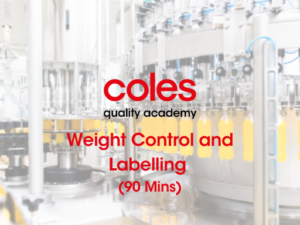 Weight Control and Labelling (90 Mins)
Weight Control and Labelling (90 Mins)
This course will cover legislative requirements in clear language and offers practical exercises to demonstrate how an effective weight control and labelling compliance program can be developed and maintained. Coles expectations for weight control and to share information about how Coles monitor incoming products to ensure legal compliance and meet consumer demands. Tool for the development of an effective weight control program and labelling compliance based on industry best practice. compliance program based on industry. Participants will be able to understand the weight control legislation and guidelines applicable to the industry, and also the role of the National Measurement Institute Inspector in their enforcement; understand the Coles requirements for weight control and labelling; and demonstrate practical skills and understanding regarding the development of a weight control program and a label checking program.
 Implementing Foreign Body Controls (90 Mins)
Implementing Foreign Body Controls (90 Mins)
Learn about foreign detection devices and how the equipment works. Gain an understanding of the types of foreign objects found in food and practical ways to minimise your risk. Learn about effective control strategies and removal methods that you can apply in your workplace. Participants will be able to explain what foreign objects are in food, where they come from and what impact this has for food manufacturers in Australia; understand preventative measures and good manufacturing practices as a means of minimising foreign object contamination; describe the defect removal methods used to prevent the occurrence of foreign objects in your food products, and explain the importance of correct calibration and validation.
 HACCP Refresher (150 Mins)
HACCP Refresher (150 Mins)
This online course provides an introduction and refresher to the principles and applications of Hazard Analysis and Critical Control Point systems (HACCP), based on the latest revisions adopted by the Codex Alimentarius Commission Food Hygiene Committee. Participants will obtain the knowledge on how to recognize the need for and importance of HACCP Principles and be able to state the primary objective and key concepts of HACCP; identify general food safety system requirements; describe the steps and principles used in developing a HACCP system; describe the purpose and importance of each principle; list the potential hazards and sources of contamination; and identify the components of a documented and implemented HACCP system.
 Root Cause Analysis (75 Mins)
Root Cause Analysis (75 Mins)
This course looks at the Root Cause Analysis Basics, Root Cause Analysis Tools and Root cause correction. Participants will be able to explain the basics of the Root Cause Analysis process, the benefits of identifying and treating the underlying causes of problems; and explain the tools used to conduct the Root Cause Analysis. Participants will also be able to describe the process steps to analyse and investigate the root cause; the process to create and implement corrective and preventive action plans for identified root causes; and Identify the appropriate practices for monitoring, verifying, and recording of corrective actions.
 Traceability (90 Mins)
Traceability (90 Mins)
Traceability procedures are a mandatory requirement of all food safety quality assurance standards. This is to ensure that a food business can identify and control all incoming goods and services that may have an impact on food safety and quality, and to ensure that all product is traceable throughout the food chain. This course looks at the basics of Traceability; the standards and requirement for Traceability, and the use of Traceability. Participants will be able to explain the benefits traceability offers; describe the regulatory requirements associated with traceability; describe the requirements of a good traceability system and perform a forward and backward trace.
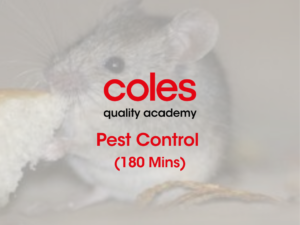 Pest Control (180 Mins)
Pest Control (180 Mins)
To gain an understanding of the attributes and practical operation of an effective pest management program – an essential pre-requisite for any Food Safety Management System. This course looks at pest control in the food industry; regulatory aspects of pest control; role of support programs; pre-requisite programs; common pests; implementing a pest control program. Participants will be able to understand the necessity for proper pest control in the food industry; understand the relevant regulatory framework addressing pest control; understand the considerations for setting up a pest control program; understand the pre-requisites for setting up a pest control program; list the common pests to guard against and understand the hazards they pose; and understand the main considerations for implementation of an effective pest control program.
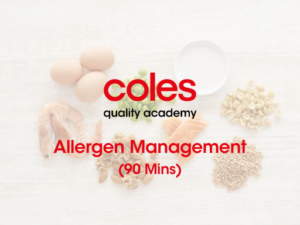 Allergen Management (90 Mins)
Allergen Management (90 Mins)
This course covers the introduction to Allergens; unexpected Allergens in Food; Allergen Control Plan; Methods of Allergen Testing and VITAL and Allergen Labelling. Participants will be able to describe the consequences of consuming food containing allergens; understand why proper allergen management of food products is crucial; describe the regulatory requirements for handling allergens in food products; understand the various considerations in handling food products containing allergens and develop an Allergen Control Plan and take related measures to manage allergens effectively.
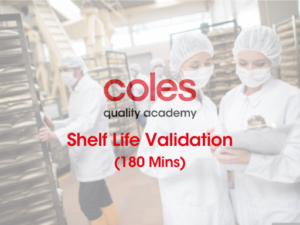 Shelf Life Validation (180 Mins)
Shelf Life Validation (180 Mins)
This course will enable you to gain a thorough understanding of the principles required to establish the shelf life of packaged food products; and will look at threats to food quality; regulatory aspects and gauging shelf life for food quality. Participants will be able to understand the need for proper shelf life determination, the relevant regulatory framework addressing shelf life; and the factors that may influence or affect determination of shelf life; and explain testing methodologies used to validate and verify shelf life estimates.
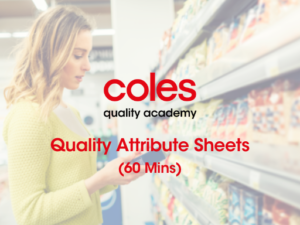 Quality Attribute Sheets (60 Mins)
Quality Attribute Sheets (60 Mins)
A Quality Attribute Sheet (QAS) is a controlled document that is written in collabortain between suppliers and Coles, which clearly defines all the product attributes including packaging, sensory characteristics and quantitative parameters. This course will demonstrate how to create a QAS and how you can use it to perform quality checks.
Free Course – click here to complete
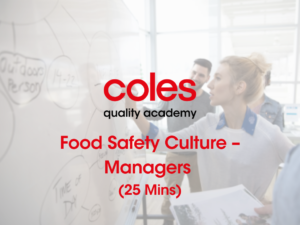 Food Safety Culture – Managers (25 Mins)
Food Safety Culture – Managers (25 Mins)
This online course on Food Safety Culture, will introduce you to some of the important principles of food safety culture. These principles will enable you to understand the importance of food safety culture and your role in ensuring that a positive food safety culture is established and maintained.
